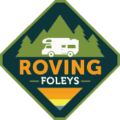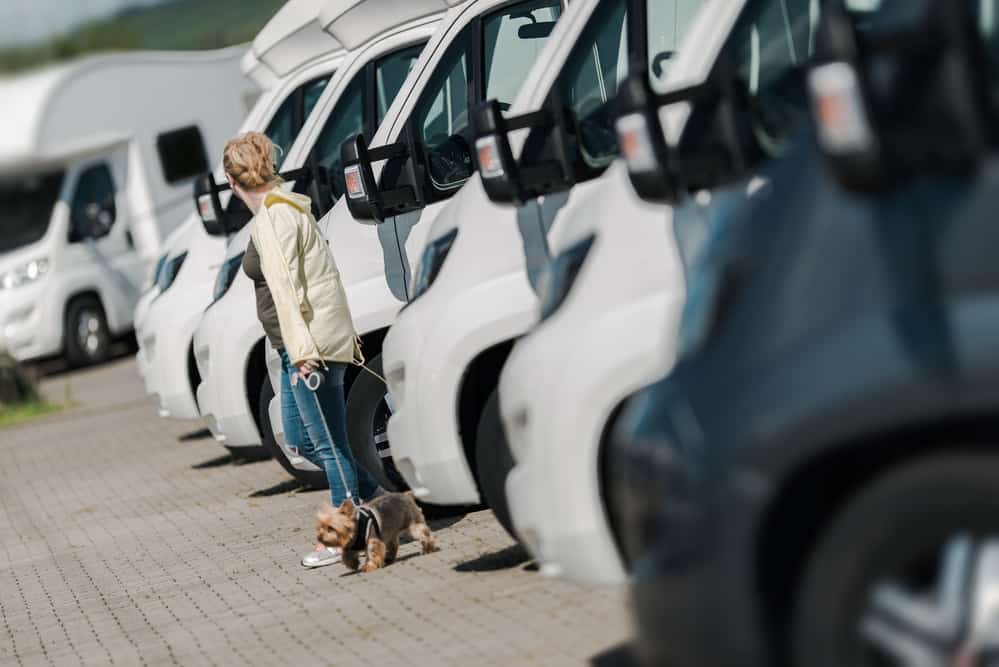Purchasing an RV is a substantial investment, and you want to make sure that you are getting the right one, the first time. We did NOT do that and that cost us several thousands of dollars!!!!
If you have been dreaming of an RV, a fifth wheel camper, or a travel trailer, you probably have a ton of questions that need to be answered.
Don’t worry; most RV newbies feel the same way. Luckily, you can get the answers that you need in this handy guide.
We have found the most common questions RV shoppers have and will answer each of these questions for you.
Understanding the Different Types of RVs
When buying an RV for the first time, the main question you should find the answer to is, what is the best type of recreational vehicle for your needs, lifestyle, and budget?
To help you decide on the kind of camper that makes sense for you, check out the following descriptions:
- Class A RVs – You have seen these campers driving down the road. Class A RVs are similar to a big luxury bus. Inside these RVs, you will find a roomy interior and lots of storage areas. Class A campers usually have at least two slide outs. The 33 foot Winnebago is an excellent example of a Class A RV. This motorhome features one double bed and two queen size beds.
- Class B RVs – Class B RVs are reminiscent of a large van. Class B motor homes are sometimes referred to as a camper van. The interior is small and usually has a kitchen area, a living room, and sometimes a small bathroom. Class B RVs do not have any slide out and very little storage. Class B motorhomes are the least expensive type of motorhomes on the market. An example of a Class B motorhome is the Thor Sequence.
- Class C RV – A Class C RV is a combination of a Class B and a Class A motor home. These motorhomes have a sleeping area over the cab. The Class C motorhome is excellent for larger families and often have slide outs to increase the living space. An example of a Class C motorhome is the 33 foot Fleetwood Jamboree.
- Fifth Wheel RV – Fifth wheel RVs are the largest towable recreational vehicle. These trailers mount to the center of a pickup truck bed and usually have two or more pull outs. The camper features a bi-level floor plan. These RVs are easy to tow and are perfect for long camping trips or full time homes. Fifth wheel trailers can be more than 40 feet long, making them an excellent choice for larger families. An example of a fifth wheel recreational vehicle is the Coachman Chaparral fifth wheel.
- Truck Camper – A truck camper is mounted above the bed of a pickup truck. These campers are great for hunters and fishermen who will be spending the night in the Great Outdoors. Most truck campers are just small enough to get out of the weather and include only a sleep area; however, there are some models that have slide outs, providing increased interior space for a comfortable trip. The Palomino Backpack Edition is an excellent example of a truck camper.
- Pop Up Campers – Popup campers are lightweight campers that feature pull out bunks for sleeping. The center of the camper will feature a small kitchenette/living area. An example of a pop up camper is the Forest River Flagstaff.
- Travel Trailer – Travel trailers are rigid frame campers ranging in size from 17 foot “teardrop” style campers to over 40 feet in length. This type of camper requires a pickup truck with ample towing capabilities. The camper hooks to the ball hitch of a truck or large SUV. Travel trailers can offer you the same luxurious spaces like those found in an apartment or condominium. Most travel trailers are on one level and may have multiple slide outs to increase the living space inside the camper. A popular travel trailer is the Keystone Springdale.
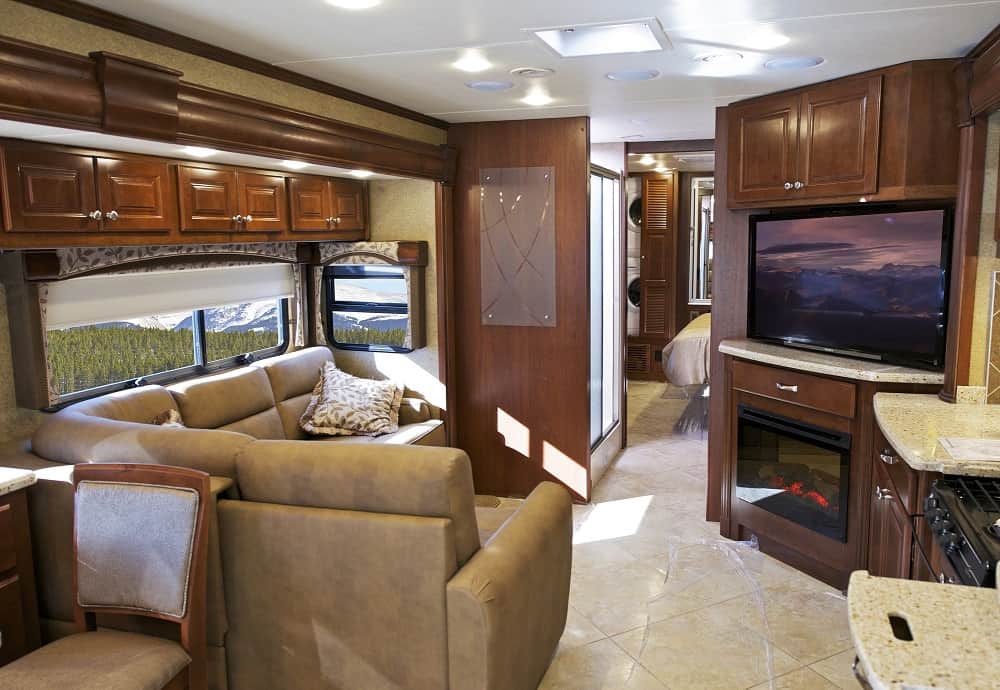
Understanding Your Needs
The next thing to consider when shopping for an RV is how you will be using the camper. Will you be dry camping (camping in an area with no electrical, plumbing, or sewer hookups)? Or will you be primarily camping inside a campground and hooking to their amenities?
You will also want to determine the features that are must-haves and the features that you can live without. Will you actually camp during the colder months when a fireplace would be a nice feature? Do you need auto leveling, or can you level the camper yourself? How much refrigerator will you need for your trips?
We have a residential size refrigerator in our 5th wheel, which we love. When we had a travel trailer, I ended up going to a grocery store every few days, now I can bulk shop at Sams Club and save money, while shopping less!
Determining the options that are important to you will help you narrow down your choice of RVs. When we were buying an RV for the first time, a salesman told us that buying an RV is all about compromise so it is important to consider what features are negotiable and which are not.
Make a list of the features that you need, the features that you want, and the features that you would like. Consider living and cooking space, sleeping arrangements, entertainment etc.
Then consider the nice-to-have items. Would you like an outdoor kitchen, a residential refrigerator, an entertainment center outdoors?
Once you have this list made, rank them from the most important to the least important. This list will help you find a camper that will fulfill your needs.
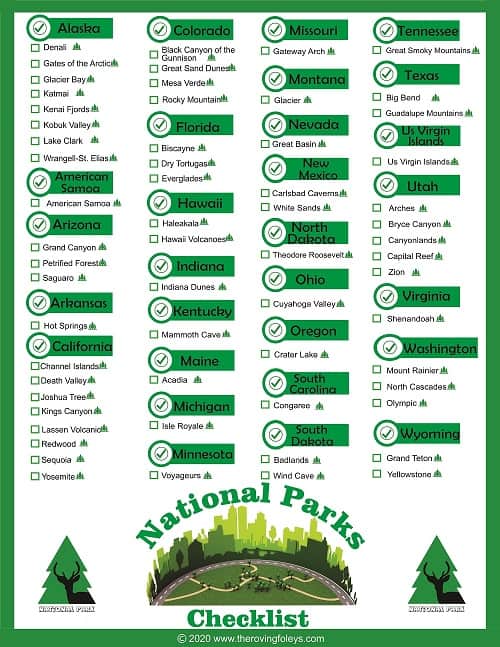
Get Your FREE Printable Here!
Just input your email and the National Parks Checklist will be delivered straight to your inbox!
We won’t send you spam. Unsubscribe at any time.
Visiting an RV Center
Business insider says that, just as with buying a car, there are plenty of factors to consider — from price, to model, to condition — in order to make sure you’re getting your money’s worth. (1)
When you arrive at an RV center, you will be inundated with so many choices, and it can be overwhelming. By having a list of must-haves and a list of things you would like to have, you can narrow down the list of campers that you are interested in looking at.
Yes, it may be interesting to look at a top of the line camper with stainless steel appliances and luxurious accommodations; however, if you will only be using your camper occasionally, these extra features may be unnecessary.
Once you have narrowed down the RVs that you are interested in looking at, it is time to look inside those that fall within your price range. You most likely will not find an RV that has every feature that you want, which is why you need to look at multiple brands and types of RVs.
When you are shopping for a recreational vehicle, you want to find an RV that is within your budget and has the features that are most important to you. If possible, find a recreational vehicle that checks off most of your wants and a few of the features you would like to have. This will help you find the perfect recreational vehicle for you and your family.
Once you have found a few rigs that have the features that you want, leave the RV center. Yes, leave the center. The salesman will try to get you to stay; however, you should leave and wait a day or two before making a decision.
* Tip: Never sign any paperwork. There have been many horror stories of shoppers signing what they thought was a release to pull a credit report or score, only to find out they signed a purchase agreement. This leads us to the next point – buying an RV.
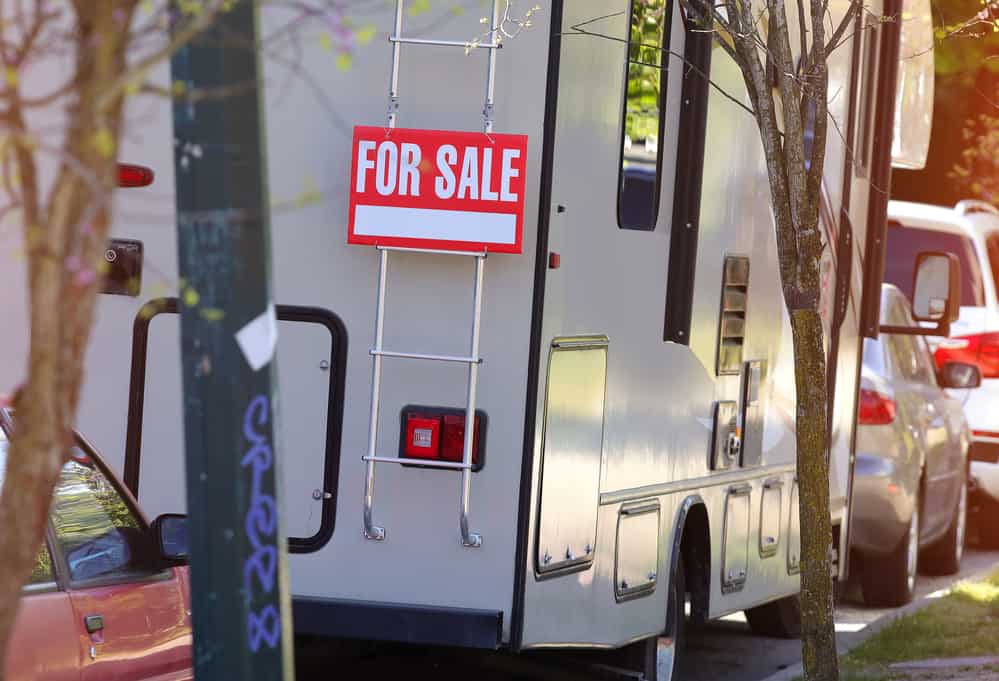
Should You Buy a New or Used RV?
When you are buying an RV for the first time, you may wonder whether you should buy a new or used RV. Purchasing a recreational vehicle is an investment so you must be careful when deciding on whether to buy a new or used RV.
Let’s look at the advantages and disadvantages of buying a new or used RV.
Advantages of Buying New
- The Latest Technology – Today’s RVs come equipped with the technological advances you have become accustomed to like Bluetooth technology, automatic heating and cooling, and GPS.
- No Damage – When you purchase a new RV, no one will have taken the RV on a trip, which means everything will be in pristine condition.
- Features – When you purchase a new RV, you can pick and choose the features that you want.
Advantages of Buying Used
- Cost – Buying a used RV can save you a lot of money. According to Green Building Elements, you lose up to 30% of its original value the moment you begin using the RV. (1)
- Insurance – The insurance on a used recreational vehicle is much cheaper than the insurance on a new recreational vehicle.
- Redecorate – Because you will save a lot of money, you will have extra money to transform your RV into the RV that you have always dreamed of owning.
Disadvantages of Buying New
- Cost – Depending on the features that you choose, the type of the RV, and the size of the RV, buying a new recreational vehicle can be quite expensive.
- Insurance – The insurance on a new RV can be quite expensive.
- Shakedown Repairs – On any new RV there will be “shakedown” repairs in the first year, so expect to spend time at the dealership.
Disadvantages of Buying Used
- Damage – A used RV may have damage that is not visible, especially if you do not know what to look for, which can end up costing you thousands.
- Upgrades – If upgrades need to be made, they can be expensive. Parts, especially on old campers, can be challenging to find.
“A salesman once told us that buying an RV is all about compromise so it is important to consider what features are negotiable and which are not.”
Buying an RV For The First Time
Purchasing an RV is similar to buying a home. A top of the line RV can cost as much as a home or a condominium. Therefore, you should take your time and make the best decision based on your budget and needs.
When shopping for a recreational vehicle, always buy from a reputable dealer. Scour the internet and read reviews on the different brands of RVs and read about the RV dealers in your area. Do not just read reviews on the dealer’s website. Read reviews on RV websites, Yelp, and social media platforms (Facebook groups are awesome for this).
Remember, people are more likely to write a negative review than they are to write a positive review. Read all reviews and see if you see a pattern of poor customer service, unsavory business practices, etc.
When you arrive at the dealership a second time, you will have a list of three or four RVs that have the features that you need. It is now time to try everything out in the RV.
- Living Room – Sit on the couch for at least ten minutes. Is it comfortable? Can you see the television from the couch? Does it feel like home? Does the entertainment center have the features that you want? How is the sound? If you enjoy listening to music outdoors, does the camper have marine grade speakers outdoors?
- Kitchen and Dining Area – Walk around the kitchen area and think of how you cook. Is the refrigerator within easy reach? Is it large enough to cook a meal? Is there enough counter space for food prep? Next, sit down at the dinette. Is there enough room for everyone to sit down to dinner and eat?
- Bathroom – The bathrooms in campers are small by nature; however, some models do have large bathrooms. Step into the shower and mimic taking a shower. Can you reach down and wash your feet? Do your elbows hit the door when you wash your hair?
- Storage – Camping requires a lot of supplies. In addition to your clothes, you will need pots, pans, dishes, silverware, camp chairs, linens, food, movies, toiletries, etc. Therefore, look for a camper that has plenty of storage.
- Bedroom – You may feel silly; however, you need to lie down on the bed and see if it is comfortable. Lie down for at least ten to fifteen minutes. Is the bed comfortable? Is it long enough? Can you sit up without bumping your head? Will you be able to get out of bed without waking your partner? If you have kids, you may want to see how stable the RV is or how much is shakes and squeeks for…well…you know.
- Outdoor Areas – Recreational vehicles typically have awnings. These awnings provide you with a shady place to sit outside and enjoy nature. Additionally, the camper will have numerous storage areas on the outside. Check out these areas to see if they provide you with enough room to store camp chairs, bicycles, grills, etc.
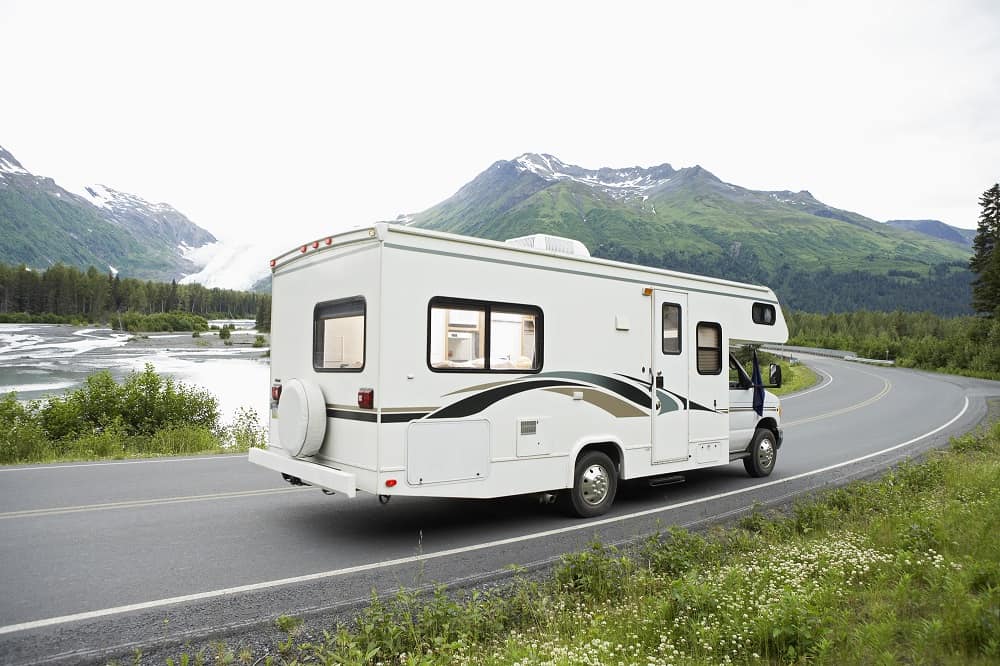
Rent an RV and Try It Out
One thing every individual should do before buying an RV for the first time is to rent an RV for several days. Renting an RV allows you to really understand what you need in a Recreational Vehicle and what luxuries you can live without.
You may need to rent several different types and sizes of campers to find out exactly what you need in an RV. Before renting an RV, talk with a salesperson, and determine the size and type of camper that will best suit your needs. If the first rental does not meet your needs, talk with the salesperson and explain what features you need that was not in the rental RV.
Better yet, check out Outdoorsy to see if there are available rentals similar to what you want to buy. You may find something close locally.
When is the Right Time to Buy?
Just like automobiles, the new models of recreational vehicles come out at the end of the year. Purchasing at the end of the year or the beginning of the year will allow you to get a better deal. The dealer will want to sell their old stock to make room for the latest model.
Purchasing at this time will enable you to buy a camper with extra features at a lower price. Negotiation is critical whenever you are purchasing a camper; however, it is extremely important when purchasing last year’s model. Salespeople want to maximize their commission; however, they are also tasked with selling the previous year’s model.
Never accept their first offer! If the dealership is not willing to negotiate, visit one of their competitors and get an offer on a comparable vehicle in writing. Take this offer back to the dealership and see if they will beat the offer. They typically will lower the price by 10 percent.
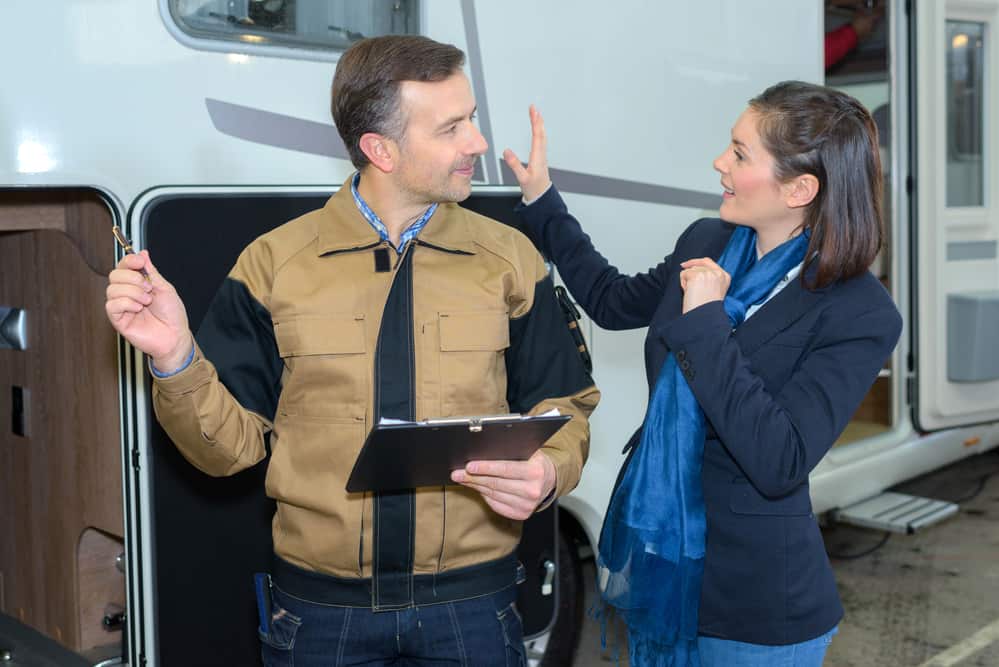
Have the RV Dealer Explain Everything
After you have made your decision, make sure that the dealer explains everything you need to know. Take notes!
Nothing is worse than arriving at a campground and not knowing how to hook up the clean water line, connect to the septic system, open the slides, etc. By taking the time to get to know your camper inside and out at the dealership, your first camping trip will be much more enjoyable.
Recreational vehicles allow you to see the country while saving money. In addition to this, a camper provides you with the privacy and the comforts of home. Why stay in a hotel and give your money to a stranger when you can use that money to invest in your camper and your finances?
Are you thinking about getting into the RV life? Check out why so many of us love living in an RV.
If you have any other questions, ask them below and we’ll do our best to answer them for you.
(1) Graham Rapier, 11 Things You Should Always Look for When Buying an RV, https://www.businessinsider.com/buying-an-rv-tips-advice-what-to-look-out-for-2019-6
(2) Oliver Smith, Do These 7 Things to Slow RV Price Depreciation https://greenbuildingelements.com/2019/06/06/slow-rv-price-depreciation/

Grainne Foley
Grainne Foley grew up in Ireland and spent summers caravanning around Europe with her family. Now, as a wife and mother of 2, she spent 5 years traveling the USA as a full time RVing family. She is passionate about travel, and helping others who are considering the RV lifestyle. She has created dozens of helpful RVing checklists which are available throughout the website, and has curated hundreds of simple, flavorful meals for families on the go.
